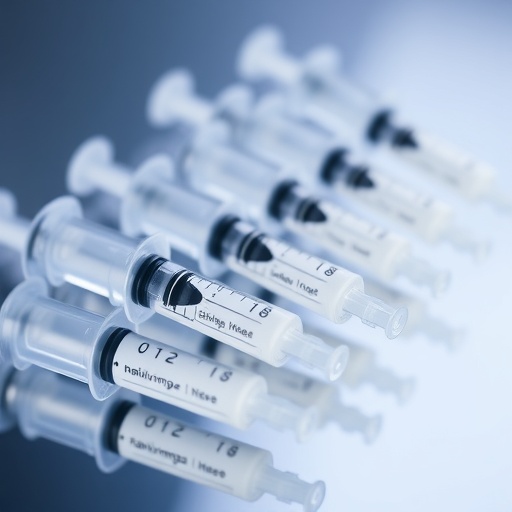In recent years, the landscape of biomedical treatments has been increasingly shaped by the advent and incorporation of biosimilars. These biologic medical products, deemed highly similar to already approved brand-name products, are paving the way for more accessible therapeutic options in various medical fields. A significant focus of research in this domain is on the stability and efficacy of these biosimilars, particularly in sensitive applications such as ophthalmology. Notably, recent research published in Advances in Therapy has provided critical insights into the evaluation of XSB-001, a biosimilar to the well-known monoclonal antibody Ranibizumab, specifically concerning its physicochemical and biological stability when prepared in syringes for intravitreal injection.
The study led by Björnestedt et al. meticulously explores the stability profile of XSB-001, focusing on two primary factors: its physicochemical characteristics and biological performance. Intravitreal injections, a common form of administration for treating retinal diseases, require careful handling of the therapeutic agent. This is crucial as any alteration in the drug’s formulation or stability can significantly impact efficacy and patient safety. The research highlights the importance of maintaining strict physicochemical stability, as changes may lead to detrimental outcomes, including reduced therapeutic activity or adverse immune responses.
Physicochemical stability covers a range of qualities including pH, concentration, and the presence of aggregates or other particulates within the solution. In this study, the authors conducted a series of rigorous tests designed to quantify these characteristics under various conditions that simulate real-world scenarios. It is particularly notable that the results demonstrated XSB-001 maintains its requisite stability in prepared syringes, pointing towards its reliability for immediate clinical use following preparation. Such findings are crucial for healthcare providers who need assurances that the biosimilar remains safe and effective throughout its intended shelf life.
.adsslot_R7QgIkSxl3{ width:728px !important; height:90px !important; }
@media (max-width:1199px) { .adsslot_R7QgIkSxl3{ width:468px !important; height:60px !important; } }
@media (max-width:767px) { .adsslot_R7QgIkSxl3{ width:320px !important; height:50px !important; } }
ADVERTISEMENT
Another focal point of the study is biological stability, which refers to the ability of the drug to retain its biological activity over time. This aspect was assessed through in vitro assays, examining the binding affinity of XSB-001 to its intended target, as well as its ability to mediate the desired pharmacological response. The researchers observed that XSB-001 exhibits a strong binding profile akin to that of Ranibizumab, suggesting that the biosimilar could effectively perform its intended role in the treatment of conditions such as age-related macular degeneration and other serious retinal disorders.
The process of stability evaluation utilized in the study is noteworthy not only for its comprehensiveness but also for its adherence to regulatory standards that govern the approval of biosimilars. Regulatory bodies worldwide, including the European Medicines Agency (EMA) and the U.S. Food and Drug Administration (FDA), require that biosimilars demonstrate comparable quality and clinical performance to their originator products. By aligning the testing strategies with these regulatory expectations, the authors of this research present a clear pathway for bringing XSB-001 to market, potentially benefiting millions of patients.
Moreover, the study offers a compelling case for the continued investment in biosimilar research. As the demand for biologic therapies surges, so too does the need for sustainable production methods that can ensure both cost-effectiveness and high-quality outputs. The findings underscore the necessity of developing robust manufacturing processes that guarantee both the stability and efficacy of biosimilars from production through to patient administration.
As medical professionals and researchers digest the findings presented by Björnestedt et al., the conversation surrounding biosimilars like XSB-001 is sure to gain momentum. The evidence supporting the safety and stability of this biosimilar could catalyze further studies in this field, leading to the exploration of additional biosimilars that may serve other therapeutic applications. Such advancements have the potential to transform patient care paradigms, ultimately fostering a healthcare environment where high-quality, affordable treatments are the norm rather than the exception.
As this research progresses towards clinical implementation, it is also imperative that ongoing surveillance of the long-term effects and outcomes of XSB-001 in real-world settings be instituted. Pharmacovigilance will play a crucial role, ensuring that data on the safety and efficacy of the biosimilar is continually accrued and analyzed. Such initiatives will not only reassure healthcare providers but also patients, fostering confidence in newer treatment options that become available.
Looking forward, the biosimilar market stands at a pivotal juncture. With regulatory pathways becoming clearer, and the technical expertise in their development advancing rapidly, the future of biosimilars like XSB-001 could dramatically reshape the treatment landscape in ophthalmology and beyond. As these products make their way into diverse therapeutic areas, they promise not just improved patient outcomes but also significant public health benefits, as the overall cost of care could be markedly reduced.
Understanding the need for persistent evaluations and ongoing clinical assessments, the scientific community and regulatory bodies must collaborate closely to ensure that biosimilars not only reach the market but thrive within it. Through committed research and vigilant oversight, the promise of biosimilars stands not just as a potential revolution in treatment options, but as a transformational force in achieving universal healthcare accessibility.
With the conclusion of this enlightening research, the implications go far beyond a single biosimilar; it sets the stage for a broader movement towards sustainability in healthcare practices and a renewed focus on patient-centered treatment solutions.
Subject of Research: Evaluation of the physicochemical and biological stability of XSB-001 (Ranibizumab Biosimilar)
Article Title: Evaluation of XSB-001 (Ranibizumab Biosimilar) Physicochemical and Biological Stability in Prepared Syringes for Intravitreal Injection.
Article References:
Björnestedt, R., Waters, S., Paišytė, A. et al. Evaluation of XSB-001 (Ranibizumab Biosimilar) Physicochemical and Biological Stability in Prepared Syringes for Intravitreal Injection.
Adv Ther (2025). https://doi.org/10.1007/s12325-025-03319-z
Image Credits: AI Generated
DOI: 10.1007/s12325-025-03319-z
Keywords: Biosimilars, XSB-001, Ranibizumab, Stability, Intravitreal Injection, Ophthalmology, Pharmaceutical Development, Regulatory Standards
Tags: advances in biosimilar researchbiological performance of monoclonal antibodiesbiosimilar formulation challengesBiosimilars in ophthalmologyimpact of stability on drug efficacyintravitreal injection safetypatient safety in biosimilar treatmentsphysicochemical characteristics of biosimilarsRanibizumab biosimilar stabilitystability evaluation of injectable drugstherapeutic options for retinal diseasesXSB-001 stability assessment





